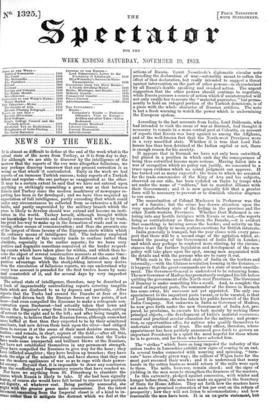According to the last accounts from India, Lord Dalhousie, who
had intended to visit the scene of war at Burmah, had thought it necessary to remain in a more central post at Calcutta, on account of reports that Russia was busy against us among the Afighans, and of the well-known fact that the North-west Provinces were in a very unsettled state. Whether it is true that Lord Dal- housie has thus been detained at the Indian capital or not, there is enough reason for his anxiety. It appears that in Burmah we have not only been outwitted, but placed in a position in which each day the consequences of
being thus outwitted become more serious. Having fallen into a war of occupation which no policy can justify, we consented to a truce upon evidence which no sound judgment can approve. It
has turned out as many expected : the truce to which we assented for the trade convenience of the King of Ava and his subjects,. observed on our side, has been violated on theirs by troops who act under the name of "robbers," but in manifest alliance with their Government; and it is now generally felt that a greater force will be necessary to prevent or to diminish ulterior disgrace to our arms.
The assassination of Colonel Mackeson in Peshaw-ur was the act of a fanatic ; but the crime has drawn attention upon the very unsatisfactory state of the feeling in the province and the other North-western Provinces. Whether Dost Mahomed is en- tering into any hostile intrigues with Russia or not,—the reports being as contradictory as those from the Danube,—it is evident that something is brewing across the border; and activity on the border is not likely to mean zealous exertions for British interests. India generally is tranquil, but the year closes with every pros- pect that there will be a second stage of the agitation which at- tended the passing of the Government of India Bill in London ; and which may perhaps be rendered more stirring, by the circum- stances that the further legislation and development of the new policy will take place upon the spot, among men acquainted with the details and with the persons who are to carry it out.
While such is the unsettled state of India on the borders and internally,—with the Chinese revolution looming in the distance,—
it happens that the great commands are in a state of much unsettle- ment. The Governor-General is understood to be returning home. The new Governor of Madras has prematurely resigned his life before quitting the government of the North-west Provinces. The Governor of Bombay is under something like a recalL And, to complete the round of important posts, the commander of the forties in Burmah has come away, his successor not yet appointed. The only one appointment to the important posts vacant, or to be vacated, is that of Lord Elphinstone, who has taken his public farewell of the East India Company. Not unknown in India as Governor of Madras, he now goes forth under the new Government of India Act, pre- pared, he proclaims, to execute his task mainly by seeking three principal objects,—the development of India's material resources; sound and practical secular education for the natives ; and promo- tion, as opportunities offer, for natives who qualify themselves to undertake situations of trust. The only officer, therefore, whose appointment has been publicly announced goes forth to govern an important Presidency in a spirit the most hopeful for those whom he is to govern, and for those who have selected him.


































